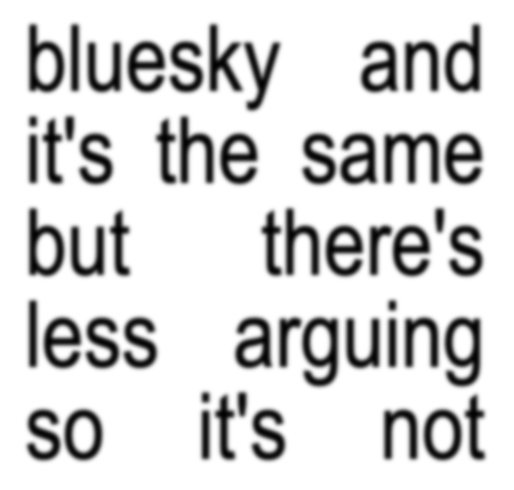The lost art of discovery
Navigating the disarray of online content and trying to rekindle a positive relationship with digital discovery.
Greetings! Hope you’ve had a most agreeable brat summer.
As I’ve been attempting to sift through the never-ending news cycle of the last few months/weeks/days/minutes, a question I’ve found myself pondering is: how does one navigate the sheer volume of online content these days?
It’s a struggle, eh?
Keeping up with current affairs is one thing, but throw into the mix the sort of things I consume for leisure and professional interest – puzzles, pictures of cats, petulant articles about AI – it’s surprising that I ever get up off the sofa.
To be honest, I still find the concept of sifting takes quite a bit of getting my head around.
It’s hard to contemplate a time when we didn’t spend our lives constantly filtering content and fighting off information at a pace faster than we’re able to process it.
To cast back to a point that ‘discovery’ meant choosing a newspaper or magazine from a rack, picking up a book because its cover was facing out on a library shelf, or selecting a TV programme from a linear schedule all feels rather quaint.
But here we are.
I scroll therefore I stress
There are periods in my life when I’ve had both healthy and troubling relationships with my online life.
Halcyon days where everything felt fresh, exciting and optimistic through to angst-soaked periods when I would repeatedly delete the Twitter app only to quietly reinstall it, hidden in an obscure folder in a corner of my iPhone that may as well have been called DIRTY LITTLE SECRET.
I have no doubt that my mental health has ebbed and flowed at least partly in line with my digital habits.
Perhaps not in quite as extreme a way as Jonathan Haidt’s The Anxious Generation would have you believe – a book that I have 🤔 some opinions about 🤔 – but certainly enough to map a correlation between doom scrolling and generally feeling like shit.
(Sidenote: here’s an enjoyable piece I doom scrolled to find out about the origins of doom scrolling.)
Anyway, I didn’t write this post to unleash yet more tiresome Gen X disquiet, I wrote it to talk about why I’m enjoying the process of discovering new stuff online again.
Broken, bamboozling, beyond repair?
In a previous post I referenced Storythings’ ‘Broken’ series, an excellent collection of articles that picked apart all the reasons why content distribution is, frankly, a shambles.
Whether it’s the deterioration of social media and search engine optimisation, the decline of certain platforms and trusted sources, and more recently the proliferation of AI slop, it’s clear there are myriad issues when it comes to finding and sorting information online.
For a pertinent example of how fragmented and somewhat ludicrous it’s all become, this article on the different ways people found out about Joe Biden’s presidential resignation is both amusing and eye-opening:

BREAKING: The ways people hear about big news these days; “into a million pieces,” says source | Nieman Journalism Lab
The New York Times and the Washington Post compete with meme accounts for the chance to be first with a big headline.
Of course it’s not like this is a new issue, but right now it seems like a particularly unholy mess.
And a lot of this revolves around the fact that people at my age and stage, and the organisations and brands we’ve represented along the way, haven’t really known what to do about the Twitter/X problem.
X not marking the spot
Back in its prime, Twitter was the go-to place for whimsical online exploration and (mostly) affable chat.
Browsing it used to be a pleasurable pastime; brilliant for new thinking and ideas, or helpful work advice, or sometimes just stupid funny ephemera.
There’s no doubt that the way it brought people together also had massive benefits – I was struck to read this post by Adam Kucharski illustrating how vital a resource it proved to be during the pandemic.
But bringing people together has also been its Achilles’ heel.
Twitter/X’s decade-long decline has meant it’s become nigh on impossible to avoid toxic, antagonistic content and trench warfare – the dream of a global melting pot/town square in tatters because it turns out we can’t help being awful to one another.
Elon Musk has, of course, a big role in this (the replies of his blue tick stans rise to the top of any halfway interesting tweets like a poo that won’t flush) but it would be disingenuous to claim that it wasn’t in pretty bad shape for much of the 2010s.
There’s a school of thought that says X’s influence remains intact, but is any perceived resurgence not just the latest in a prolonged series of dead cat bounces?
If a typical user journey means links or conversations I follow require me to fact check, verify sources, and validate the content hasn’t been created by a bot, crank or Nazi, then that’s surely an absurd use of anyone’s time.
And wouldn’t we [checks Screen Time stats] all like to be making better use of that?
Humans in the loop
So what to do?
All I can offer is my own personal experience and play back how my online consumption habits have changed over the last year.
For the first time in aaaggggeeeessss I’ve been enjoying the connections I’ve been making and the material I’ve been discovering as a result.
I think there are three reasons for this.
1. Newsletters
I’ve definitely subscribed to far too many newsletters in the last year – partly as a result of tending my own, partly because there are so many high-quality publications available [grudging nod to Substack].
The upside of clicking subscribe with such gay abandon means I know spending time in my inbox will mean unearthing stuff that floats my boat.
The newsletter wave appears to have triggered a renaissance in blogging and weeknotes too, so there’s a strong undercurrent of people publishing their thinking independently of centralised platforms.
2. Bluesky
Bluesky feels like it’s starting to reach the sort of critical mass that properly makes things tick. It’s the first of the Twitter variants that I’ve felt at ease with, and the vibe at the moment is quite 2009-with-a-tentative-side-order-of-let’s-not-screw-this-up.
If you have a Bluesky account (hiya 👋) you’ve probably noticed an influx of new people over the last month as the Twitter exodus grows pace. X-odus, ha!

3. Actual human beings
I’m intentionally seeking out things that genuinely reflect my interests, and spending less time at the mercy of algorithms.
I’m fond of the phrase “human in the loop” when it comes to describing guardrails on AI, as detailed in this 2021 IEEE Spectrum article.
When it comes to online discovery, I’m starting to wonder if the human is the loop.
Selecting who I follow, what I subscribe to, the stories I immerse myself in, the rabbit holes I jump into, and doing so based on recommendations from real human beings – where there’s a reasonable sprinkling of trust and empathy – feels pleasantly life affirming.
It’s so tiresome dealing with sites whose algorithms dominate and undermine the way content is sourced and served. Feature creep and monetisation getting in the way of a satisfying, safe user experience seems like an increasingly low-margins game.
To put it another way, maybe we’ve all reached peak self-scan.

What could Asda and Morrisons move away from self-checkout mean? - BBC News
Supermarkets are beginning to question the divisive technology after years of criticism from shoppers.
Swipe left
Yes, all of this still involves me spending too much time staring at a screen.
And yes, there’s a risk of me bouncing merrily around my own echo chamber.
I’m also well aware that nothing comes for free in this world. When Bluesky burns through its seed funding it’ll have to find a way to sustain itself.
With lots of social platforms the trade-offs have been at the expense of the end user, so let’s see how Bluesky choose to play it. This interview with Rose Wang, their Chief Operating Officer, offers some refreshing reassurance that the team are striving to learn from mistakes of the past. [keeps fingers crossed]
Maybe nothing in this post resonates. Maybe you’re perfectly happy with your browsing habits, thank you very much.
But if you find yourself lost in a doom scroll, or asking questions like “hmmmm, why have videos suddenly appeared in my LinkedIn feed?”, or wondering why you see nothing but ads on Insta, maybe some simple tweaks could open up a whole new chapter of online discovery.
🦋 Thank you for reading.
Add a comment: